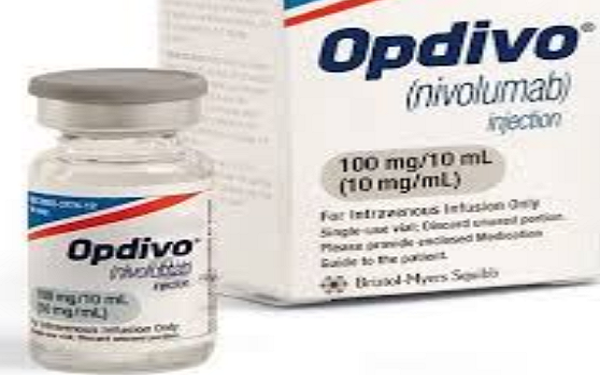
“HCC is an aggressive disease in need of different treatment approaches,”4,5,6 said Anthony B. El-Khoueiry, M.D., lead investigator and associate professor of clinical medicine and phase I program director at the Keck School of Medicine, University of Southern California (USC) and the USC Norris Comprehensive Cancer Center. “The overall response rate observed in the Opdivo + Yervoy cohort of the CheckMate -040 trial underscores the potential of this dual immunotherapy as a possible treatment option for patients.”1
In the CheckMate -040 cohort of HCC patients previously treated with sorafenib, after a minimum follow up of 28 months,1 33% (16/49; 95% CI: 20-48) of patients responded to treatment with Opdivo + Yervoy; 8% (4/49) had a complete response (CR) and 24% (12/49) had a partial response (PR).1 Duration of responses (DOR) ranged from 4.6 to 30.5+ months, with 88% lasting at least six months, 56% at least 12 months and 31% at least 24 months.1 Overall response rate (ORR) and DOR were assessed by Blinded Independent Central Review (BICR) using Response Evaluation Criteria in Solid Tumors version 1.1 (RECIST v1.1).1 ORR assessed by BICR using modified RECIST was 35% (17/49; 95% CI: 22-50), with a CR reported in 12% (6/49) of patients and a PR reported in 22% (11/49) of patients.1
Opdivo is associated with the following Warnings and Precautions including immune-mediated: pneumonitis, colitis, hepatitis, endocrinopathies, nephritis and renal dysfunction, skin adverse reactions, encephalitis, other adverse reactions; infusion-related reactions; embryo-fetal toxicity; and increased mortality in patients with multiple myeloma when Opdivo is added to a thalidomide analogue and dexamethasone, which is not recommended outside of controlled clinical trials.1 Please see the Important Safety Information section below, including Boxed WARNING for Yervoy (ipilimumab) regarding immune-mediated adverse reactions, as well as select safety information from CheckMate -040.
“The incidence of liver cancer is rising in the United States, and HCC is the most common and aggressive form of the disease,”4,5,6,7,8,9 said Andrea Wilson, president and founder, Blue Faery: The Adrienne Wilson Liver Cancer Association. “Today’s approval provides a new option for patients with HCC previously treated with sorafenib, giving the community more hope.”1
Opdivo + Yervoy is the only dual immunotherapy approved by the FDA in this setting. The therapy features a potentially synergistic mechanism of action that targets two different checkpoints (PD-1 and CTLA-4) and works in complementary ways.1
“We recognize there is a critical need to provide patients with aggressive forms of cancer, like HCC, new treatment options that may offer clinically meaningful and ultimately durable responses,” said Adam Lenkowsky, general manager and head, U.S., Oncology, Immunology, Cardiovascular, Bristol Myers Squibb. “Today’s announcement builds on our legacy in pioneering immunotherapy treatments and is an important step in our commitment to transforming patients’ lives through science.”
Opdivo + Yervoy was granted Breakthrough Therapy Designation for this indication and a Priority Review from the FDA.
*Dr. Anthony B. El-Khoueiry is a paid consultant for Bristol Myers Squibb.
About the CheckMate -040 Trial Design
CheckMate -040 (NCT01658878) is a Phase 1/2 open-label study that included a cohort of patients with HCC who progressed on or were intolerant to sorafenib and received Opdivo + Yervoy.1,10 The trial included patients who were PD-L1 expressors and non-expressors.3 Key eligibility criteria included histologic confirmation of HCC and Child-Pugh Class A cirrhosis status.1 Additional eligibility criteria included those who were infected with active HCV or active HBV, or were uninfected.1,3 Patients with active autoimmune disease, brain metastasis, a history of hepatic encephalopathy, clinically significant ascites, infection with HIV, or active co-infection with HBV and HCV or HBV and HDV were excluded.1 Patients with known fibrolamellar HCC, sarcomatoid HCC, and mixed cholangiocarcinoma and HCC were also excluded.3 A total of 49 patients were treated with Opdivo 1 mg/kg IV and Yervoy 3 mg/kg IV every three weeks for four doses, followed by Opdivo 240 mg every two weeks until disease progression or unacceptable toxicity.1 The major efficacy outcome was ORR, as assessed by BICR using RECIST v1.1 and mRECIST.1 Duration of response was also assessed.1
Select Safety Profile from CheckMate -040 Study
The safety of Opdivo 1 mg/kg and Yervoy 3 mg/kg was evaluated in 49 patients.1 Serious adverse reactions occurred in 59% of patients receiving Opdivo + Yervoy.1 Treatment was discontinued in 29% of patients and delayed in 65% of patients for an adverse reaction.1 Serious adverse reactions reported in ≥4% of patients were pyrexia, diarrhea, anemia, increased AST, adrenal insufficiency, ascites, esophageal varices hemorrhage, hyponatremia, increased blood bilirubin, and pneumonitis.1 The most common adverse reactions (reported in ≥20% of patients) were rash (53%), pruritus (53%), musculoskeletal pain (41%), diarrhea (39%), cough (37%), decreased appetite (35%), fatigue (27%), pyrexia (27%), abdominal pain (22%), headache (22%), nausea (20%), dizziness (20%), hypothyroidism (20%), and weight decreased (20%).1
Indications
OPDIVO® (nivolumab), in combination with YERVOY® (ipilimumab), is indicated for the treatment of patients with unresectable or metastatic melanoma.
OPDIVO® (nivolumab), in combination with YERVOY® (ipilimumab), is indicated for the treatment of patients with intermediate or poor risk, previously untreated advanced renal cell carcinoma (RCC).
OPDIVO® (nivolumab), in combination with YERVOY® (ipilimumab), is indicated for the treatment of adults and pediatric patients 12 years and older with microsatellite instability-high (MSI-H) or mismatch repair deficient (dMMR) metastatic colorectal cancer (CRC) that has progressed following treatment with a fluoropyrimidine, oxaliplatin, and irinotecan. This indication is approved under accelerated approval based on overall response rate and duration of response. Continued approval for this indication may be contingent upon verification and description of clinical benefit in confirmatory trials.
OPDIVO® (nivolumab), in combination with YERVOY® (ipilimumab), is indicated for the treatment of patients with hepatocellular carcinoma (HCC) who have been previously treated with sorafenib. This indication is approved under accelerated approval based on overall response rate and duration of response. Continued approval for this indication may be contingent upon verification and description of clinical benefit in the confirmatory trials.
Source: Biospace